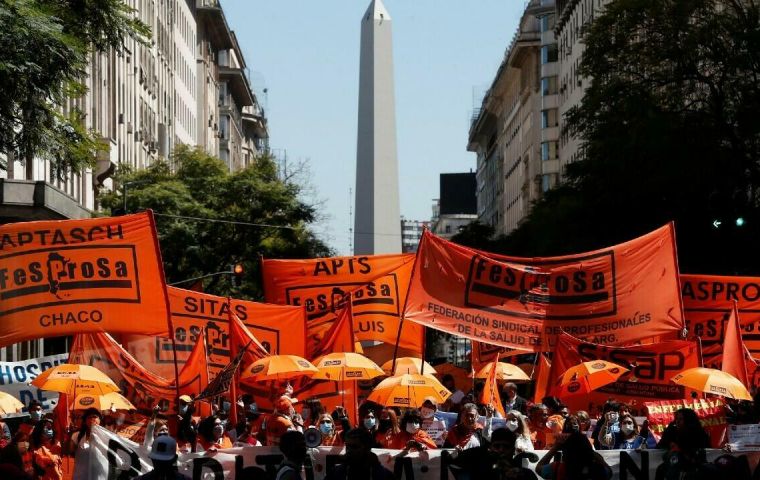MercoPress. South Atlantic News Agency
Argentine social organizations stage protest to demand minimum wage rise
 Protesters demand a minimum monthly wage of AR $ 70,000
Protesters demand a minimum monthly wage of AR $ 70,000 Demonstrators from Argentine social organizations convened Tuesday at Buenos Aires' iconic Plaza de Mayo to demand a minimum wage increase, which in their view should be no less than AR $ 70,000 (US $ 378 at the unofficial exchange rate).
“We reject structural adjustment and right-wing alternatives in response to the crisis,” the leftwing groups behind the protests such as Polo Obrero, the Partido Obrero, the Partido de los Trabajadores Socialistas, Barrios de Pie, Frente de Organizaciones en Lucha and the Movimiento de los Pueblos among others said in a joint statement published by the Buenos Aires daily Clarín.
The groups highlighted the seemingly endless “decline in the purchasing power of the working class,” which “in the face of repeated crises, governments of different political colours, together with the business community and union bureaucracies have systematically set minimum wages below the level of indigence, intending to continue to maximize their profits at the cost of higher levels of income exploitation and hunger.”
The document also highlighted that ”after a year of pandemic, where unemployment, poverty, the precariousness of health and education deepened, the government of the Frente de Todos began in 2021 making a fiscal adjustment” which included lifting all subsidies to those who “do not even have a fixed income.”
The groups also underscored the non-existent efforts on the part of the Government so that millions can own their homes in addition to insufficient measures against gender violence, as well as the worsening of the living conditions of women, lesbians, trans, transvestites and non-binary people, who are “the sectors most affected by economic crises.”
The groups maintained that “in the face of an uncontrolled increase in food prices and millions of workers who do not even have access to the basic food basket, these great urgencies must be resolved.”
Barrios de Pie's Silvia Saravia said in a statement that “for months we have argued that the way out of the crisis should not be an adjustment.”
“More than fights between governments, we would like to see a response consistent with the pocket problems of much of the country,” she added.
”For years the salary has been sinking, and each crisis represents less purchasing power. Year after year we become poorer and inflation buries the meagre income,” she insisted. “We need an immediate solution,” she went on.
Many of the protesters were health care workers from the national and Buenos Aires City (CABA) systems who demanded their trades be acknowledged for what they are. “We continue to demand professional, salary and labour recognition of nursing,” CABA nurse Carolina Cáceres said.
Activity in downtown Buenos Aires has waned down since 2020 in a way that these marches nearly go unnoticed were it not for media coverage. Home office work in addition to Sept. 21's Student Day's holiday whereby there were no classes at high schools and universities leave these kinds of protests without the social impact of prepandemic times.




Top Comments
Disclaimer & comment rulesCommenting for this story is now closed.
If you have a Facebook account, become a fan and comment on our Facebook Page!